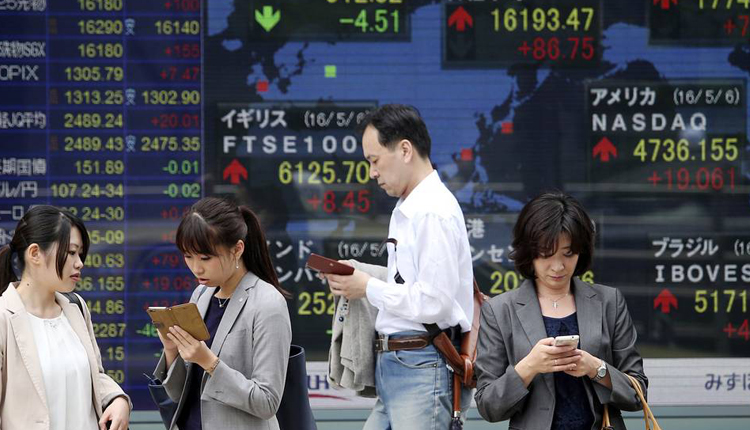Markets in Asia edged up on Friday as hopes rise on a potential trade deal between China and the U.S.
The Nikkei 225 in Japan advanced 0.38% to close at 21,807.50, as shares of companies which are dependent on Chinese demand saw gains: Fanuc and Hitachi Construction Machinery advanced 1.21% and 1.15%, respectively. The Topix index also added 0.35% to finish at 1,625.75.
The moves in Tokyo came after data showed that Japanese household spending rose less than expected in February, rising 1.7% in February as compared to the year before, as compared to a median estimate for a 2.1% annual increase, Reuters reported.
Over in South Korea, the Kospi rose 0.14% to close at 2,209.61. Shares of industry heavyweight Samsung Electronics slipped 0.21% after the company warned that its first-quarter profits likely dropped almost 60% as compared to a year ago.
Australia’s ASX 200 slipped 0.83% to close at 6,181.30, with nearly all sectors seeing declines.
The stock markets in China and Hong Kong were closed on Friday for a holiday.
Chinese Vice Premier Liu He said a new consensus had been reached between Beijing and Washington on U.S.-China trade, Chinese official state media Xinhua reported on Friday. Liu led a delegation to Washington this week to meet with U.S. officials for another round of high-level negotiations as the two sides seek to end a potentially devastating trade conflict.
One analyst, however, told CNBC’s “Street Signs” on Friday that any deal that emerges is unlikely to be as “comprehensive as Donald (Trump) would like to tell us,” nor would it “iron out all the problems.”
“Remember, we’ve had … the big (North American Free Trade Agreement) change which basically was a name change. We’ve had the denuclearization of the Korean Peninsula, how did that work out? You know, Trump promises big things, and he says we’ll get a deal, and yes there will be some movement. But I think, you know, the fundamental way that (the) Chinese run their economy is not going to be changing anytime soon,” said Fraser Howie, an independent analyst.
“The trade deal has already been priced in, probably around 80 percent,” Eugenia Victorino, head of Asia strategy at SEB, told CNBC’s “Capital Connection” on Friday. “At this point, I wouldn’t be so excited considering that it’s basically the same headline in the last few weeks and they’re just kicking the can down the road.”
“Until there is a specific date I wouldn’t really be that optimistic. Even so, the last 10% … of the trade negotiations are really the tricky part,” Victorino said.
Currencies and oil
The U.S. dollar index, which tracks the greenback against a basket of its peers, was at 97.217 after touching an earlier high of 97.327.
The Japanese yen, widely seen as a safe-haven currency, traded at 111.64 against the dollar after seeing an earlier low of 111.79. The Australian dollar changed hands at $0.7126 following a prior low of $0.7105 during the session.
Oil prices declined in the afternoon of Asian trading hours. The international benchmark Brent crude futures contract slipped 0.39% to $69.13 per barrel after breaking beyond the $70 per barrel barrier in the previous session. Meanwhile, U.S. crude futures fell 0.21% to $61.97 per barrel.
Meanwhile, as oil prices edge ever higher this year amid tightening global crude supply, Libya, a major producer in the Organization of the Petroleum Exporting Countries, teetered on the edge of war after the country’s eastern military leader, General Khalifa Haftar, ordered his forces to march on the capital of Tripoli.
“As we have repeatedly warned, oil output could once again become a casualty of Libya’s unstable security environment,” strategists at RBC Capital Markets wrote in a note.
“Haftar may find himself overextended and his rivals may seize the opportunity to try wresting control of the energy facilities away from him,” they said, citing a past example when an opponent “briefly ousted” Haftar’s forces from oil terminals in the east of the country.


